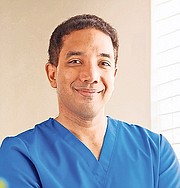By DR GREGGORY PINTO
Repeatedly waking up at night to urinate can be a frustrating problem endured by tens of thousands of Bahamian women, men and children.
Approximately 30 percent of women in the US suffer from nocturia, excessive nighttime urination.
An US study of over 5,000 men over the age of 20 years found that one in five men woke up more than twice in the night to urinate.
Middle-aged and older men in particular are sadly plagued with sleep deprivation due to frequent nightly trips to the bathroom.
The reasons behind daytime and nighttime increased urinary frequency have several distinct, separate causes and some overlapping causes.
It is relatively common for people to have severe urinary frequency at night and no daytime urinary frequency.
What is keeping you up at night?
It is important to determine whether nocturnal polyuria is occurring, which is defined as 33 percent of the total daily urine output occurring at night, or nighttime urine production greater than 90ml/hour.
There are three types of nocturia.
Nocturnal polyuria may be caused by multiple comorbidities such as congestive cardiac failure, leg swelling, diabetes mellitus, obstructive sleep apnea, excessive fluid intake , excessive intake of diuretics like alcohol and caffeine.
Blood pressure should dip at night and when it does not, the physiological result could be increased urine production by the kidneys.
The second cause of nocturia is diminished nighttime urinary bladder capacity, which leads to a reduced volume of urine that the bladder can hold at night.
The main causes are an obstructive prostate in men, most commonly, secondary to benign prostate hyperplasia, voiding dysfunction conditions, urinary tract stones, anxiety, neurogenic bladder, diabetic cystopathy, urinary tract malignancy.
Many Bahamian middle-aged men and older have benign prostate hyperplasia that leads to bladder outlet obstruction and resultant incomplete bladder emptying.
A large number of these men also have a very large middle lobe of prostate that causes blockage of the outlet of the bladder and the prostate middle lobe can also grow into the bladder and reduce the bladder capacity; so these afflicted men hold smaller volumes of urine in their bladder.
The third cause of nocturia is global polyuria often caused by diabetes mellitus and diabetes insipidus. The body produces a nature hormone vasopressin that reduces the volume of urine produced by the kidneys. A vasopressin deficiency can lead to nocturia.
Stress and anxiety can contribute to frequent nighttime bathroom trips to urinate. Any body stress response can lead to nocturia. Anxiety often leads to superficial sleep which can make a person more susceptible to waking up to pee.
Going to bed late and falls in blood sugar levels, often related to anxiety/stress, also lead to higher rates of nocturia.
Multiple studies have shown conclusively that black middle-aged men have a high rate of multiple nighttime urination when suffering from uncontrolled hypertension.
Waking up to pee, then finally falling back to sleep, with the annoying urgent need to wake up yet again to pee. This is the terrible nighttime cycle of events for far too many Bahamians.
An urologist can allow you to gain control of your bladder again and finally have a much needed restful sleep.
A sleep deprived existence can have many devastating negative health consequences. Improve your quality of life and stop waking up to pee all night, every night.
Compassionate, confidential urological management of your frequent urinating awaits you.
• Dr Greggory Pinto is a Bahamian urologist who has trained in South Africa, Germany and France. He is a member of the European Association of Urologists. He can be reached at Urology Care Bahamas at the Surgical Suite, Centerville Medical Centre, Collins Avenue and Sixth Terrace. Call (242) 326-1929, email: welcome@urologycarebahamas.com, or visit the website:www.urologycarebahamas.com.





Comments
Use the comment form below to begin a discussion about this content.
Sign in to comment
OpenID